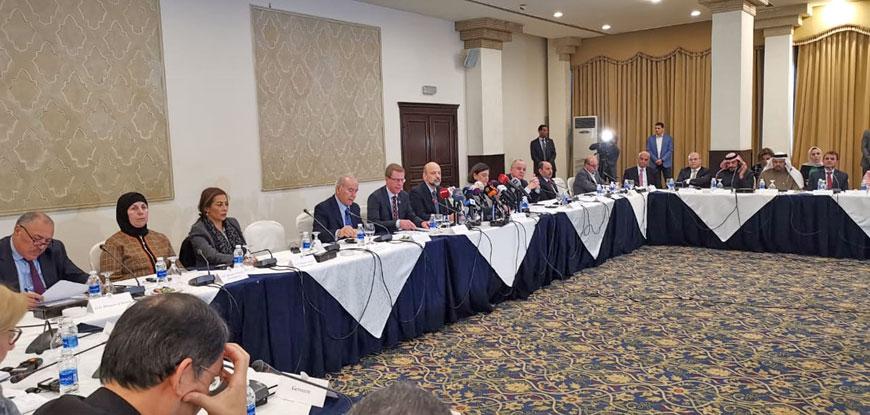You are here
‘2019 WEF offers opportunity for promoting investment in Jordan’
By Mohammad Ghazal - Apr 04,2019 - Last updated at Apr 04,2019
AMMAN — The 2019 World Economic Forum on the Middle East and North Africa, which the Kingdom is hosting on April 6-7, is part of Jordan’s continued efforts to promote investments in the country and unlock its potential in several key sectors, the government said on Thursday.
The forum, which will attract high profile participants from the private and the public sectors from around the world, will provide an opportunity for exchanging viewpoints and opportunities in various arenas, Minister of Planning and International Cooperation Mary Kawar said in an interview with The Jordan Times Thursday.
The government, she added, will present several investment opportunities during the forum in many sectors, including water, education, energy and infrastructure, among others, and will highlight Jordan’s reforms and challenges, the minister said.
Referring to challenges facing the Kingdom, the minister said they include Jordan’s high indebtedness, which stands at 94.9 per cent of the gross domestic product, noting that the issue started with the global financial crisis, followed by a refugee crisis.
‘Stunted growth’
“We had an energy crisis after the halt in Egyptian gas supply due to the situation in Sinai. We also have a water crisis due to global warming and an overnight population increase of 10 per cent owing to refugees. So our economic growth has been stunted and unemployment reached a record high of 18 per cent affecting all segments of society, but especially young women and men,” Kawar noted.
“Jordan’s per capita income has declined this decade, not because we did not have economic growth but because of the population increase,” she added.
The government took “very difficult steps” in following contractionary fiscal measures of about 13 per cent of gross domestic product since 2012 to safeguard Jordan’s macroeconomic stability, which helped Jordan remain resilient, Kawar told The Jordan Times.
“Yet, at the same time, these measures have been suffocating the economy. Especially when we have already been negatively and substantially impacted by regional conditions, the refugee influx, a deteriorating level of services in key sectors and areas and high unemployment,” she said.
To address these issues and overcome challenges, the government is working on implementing some initiatives linked to the national budget, the rule of law, productivity and services, while also working on the economic front, according to the minister.
“Our immediate focus is on growth… We want economic stability and predictability for achieving a high standard of living for all Jordanians, based on a dynamic private sector as the driver of growth,” the minister added.
The government has developed a five-year “Reform for Growth and Job Creation Matrix” to put Jordan on this transformative trajectory, which is summarised in a programme available for all to see, Kawar noted.
Jordan launched the plan at the London Initiative in February, which brought together senior government officials, members of multilateral development and financial organisations, civil society and high-level investors and businesspeople from over 60 countries to help support Jordan’s transition to a more productive, competitive economy.
Kawar added that the government is also taking measures to expand the availability and reliability of public transportation, improve water supply, reduce the cost of energy and make better use of “our internationally acknowledged, well-educated and skilled citizens”, with an emphasis on Jordanian women’s employment opportunities.
As for refugees, Jordan has, by far, set a regional and global model in terms of dealing with the Syrian refugee crisis at the risk of reversing hard-earned development gains, Kawar said.
“We remain committed to providing Syrian refugees with access to education, healthcare and other basic services, as well as with access to formal jobs and economic opportunities,” she said.
“As part of our commitment to leaving no one behind and preventing a lost generation of Syrian children, we have continuously stressed the importance of improving the quality of education for both Jordanians and Syrian refugees. Jordan continues to be committed to the provision of free certified education for all children, regardless of their registration status or nationality,” she added.
Currently, 134,121 Syrian children are enrolled in public schools, 204 schools operate under a double-shift system to accommodate Syrian children and there are 45 schools operating inside camps, the minister noted.
Additionally, 2,601 students aged 9-12 years were enrolled in 99 catch-up centres in double-shift schools, while 3,242 students attended the drop-out programme and 2,548 have received access to post-secondary education, she added.
“With all these challenges and considerations, we have reached the limits in terms of additional fiscal policies we can adopt… our policies have helped fiscally, but not in regard of growth. That is why Jordan is keen on moving ahead with its growth story, through implementing key reforms and unlocking potential in key sectors,” she added.
Related Articles
AMMAN — Minister of Planning and International Cooperation Mary Kawar on Sunday said that Jordan is expected to receive around $3 billion in
AMMAN — Jordan and the international community on Wednesday endorsed a $2.4-billion Jordan Response Platform (JRP) for the Syria Crisis for
DEAD SEA – With more than 140,000 Syrians studying in the Kingdom’s schools, the education sector is suffering and hopes are high for the ab

















